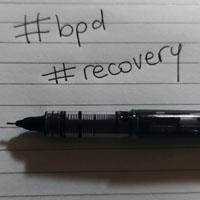Reflective functioning and personal recovery process of users with borderline personality disorder on Instagram: an explorative study using computerized and thematic analysis

Submitted: May 3, 2020
Accepted: September 12, 2020
Published: January 18, 2021
Accepted: September 12, 2020
Abstract Views: 1474
PDF: 633
HTML: 23
HTML: 23
Publisher's note
All claims expressed in this article are solely those of the authors and do not necessarily represent those of their affiliated organizations, or those of the publisher, the editors and the reviewers. Any product that may be evaluated in this article or claim that may be made by its manufacturer is not guaranteed or endorsed by the publisher.
All claims expressed in this article are solely those of the authors and do not necessarily represent those of their affiliated organizations, or those of the publisher, the editors and the reviewers. Any product that may be evaluated in this article or claim that may be made by its manufacturer is not guaranteed or endorsed by the publisher.
Similar Articles
- Oliver Evers, Paul Schröder-Pfeifer, Heidi Möller, Svenja Taubner, How do personal and professional characteristics influence the development of psychotherapists in training: Results from a longitudinal study , Research in Psychotherapy: Psychopathology, Process and Outcome: Vol. 22 No. 3 (2019)
- Michael J. Lambert, Gianluca Lo Coco, Simple methods for enhancing patient outcome in routine care: Measuring, monitoring, and feedback , Research in Psychotherapy: Psychopathology, Process and Outcome: Vol. 16 No. 2 (2013)
- Vittorio Lingiardi, Laura Bonalume, Antonello Colli, Daniela Gentile, Annalisa Tanzilli, The Psychotherapy Process Q-set from the Perspective of the Italian Research in Psychotherapy: Commentary on a Paper by J. Stuart Ablon, Raymond A. Levy, and Lotte Smith-Hansen , Research in Psychotherapy: Psychopathology, Process and Outcome: Vol. 14 No. 2 (2011)
- Francesco Gazzillo, Adriano Schimmenti, Ivan Formica, Alessandra Simonelli, Sergio Salvatore, Effectiveness is the gold standard of clinical research , Research in Psychotherapy: Psychopathology, Process and Outcome: Vol. 20 No. 2 (2017)
- Raffaele Popolo, Angus MacBeth, Stefano Brunello, Flaviano Canfora, Ercan Ozdemir, Daniela Rebecchi, Cecilia Toselli, Gloria Venturelli, Giampaolo Salvatore, Giancarlo Dimaggio, Metacognitive interpersonal therapy in group: a feasibility study , Research in Psychotherapy: Psychopathology, Process and Outcome: Vol. 21 No. 3 (2018)
- Alessandro Talia, Svenja Taubner, Madeleine Miller-Bottome, Advances in research on attachment-related psychotherapy processes: seven teaching points for trainees and supervisors , Research in Psychotherapy: Psychopathology, Process and Outcome: Vol. 22 No. 3 (2019)
- Paolo Migone, The influence of pharmaceutical companies , Research in Psychotherapy: Psychopathology, Process and Outcome: Vol. 20 No. 2 (2017)
- Agata Andò, Marzia Di Girolamo, Claudia Pignolo, Alessandro Zennaro, Luciano Giromini, Amedeo Minichino, Adriana Salatino, Rosalba Morese, Personality features and vulnerability to stress: a case study on hyperhidrosis , Research in Psychotherapy: Psychopathology, Process and Outcome: Vol. 22 No. 1 (2019)
- Elena Faccio, Francesca Turco, Antonio Iudici, Self-writing as a tool for change: the effectiveness of a psychotherapy using diary , Research in Psychotherapy: Psychopathology, Process and Outcome: Vol. 22 No. 2 (2019)
- Margarete Finger-Ossinger, Henriette Löffler-Stastka, Self-reflectivity: a moment of professionalization in psychotherapy training , Research in Psychotherapy: Psychopathology, Process and Outcome: Vol. 21 No. 3 (2018)
<< < 17 18 19 20 21 22 23 24 25 26 > >>
You may also start an advanced similarity search for this article.

 https://doi.org/10.4081/ripppo.2020.463
https://doi.org/10.4081/ripppo.2020.463





